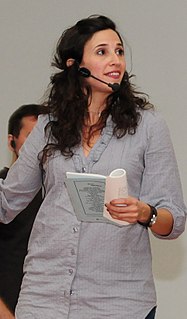A Quote by Hal Whitehead
Studying the behavior of large whales has been likened to astronomy. The observer glimpses his subjects, often at long range; he cannot do experiments, and he must continually try to infer from data that are usually inadequate.
Related Quotes
The physicist, in his study of natural phenomena, has two methods of making progress: (1) the method of experiment and observation, and (2) the method of mathematical reasoning. The former is just the collection of selected data; the latter enables one to infer results about experiments that have not been performed. There is no logical reason why the second method should be possible at all, but one has found in practice that it does work and meets with reasonable success.
I know I must conceal my sentiments: I must smother hope; I must remember that he cannot care much for me. For when I say that I am of his kind, I do not mean that I have his force to influence, and his spell to attract: I mean only that I have certain tastes and feelings in common with him.I must, then, repeat continually that we are forever sundered: - and yet, while I breathe and think, I must love him.
The scientific observer of the realm of nature is in a sense naturally and inevitably disinterested. At least, nothing in the natural scene can arouse his bias. Furthermore, he stands completely outside of the natural so that his mind, whatever his limitations, approximates pure mind. The observer of the realm of history cannot be disinterested in the same way, for two reasons: first, he must look at history from some locus in history; secondly, he is to a certain degree engaged in its ideological conflicts.
I wish that one would be persuaded that psychological experiments, especially those on the complex functions, are not improved [by large studies]; the statistical method gives only mediocre results; some recent examples demonstrate that. The American authors, who love to do things big, often publish experiments that have been conducted on hundreds and thousands of people; they instinctively obey the prejudice that the persuasiveness of a work is proportional to the number of observations. This is only an illusion.
[Microscopic] evidence cannot be presented ad populum. What is seen with the microscope depends not only upon the instrument and the rock-section, but also upon the brain behind the eye of the observer. Each of us looks at a section with the accumulated experience of his past study. Hence the veteran cannot make the novice see with his eyes; so that what carries conviction to the one may make no appeal to the other. This fact does not always seem to be sufficiently recognized by geologists at large.
I was drawn to astronomy by a teenage existential quest. Around 13, I was deep into wondering about the meaning of life and what I was doing here. I turned to religion, but that did nothing for me. I got to wondering where was here. So, I began studying astronomy and became enthralled by what I learned.


































